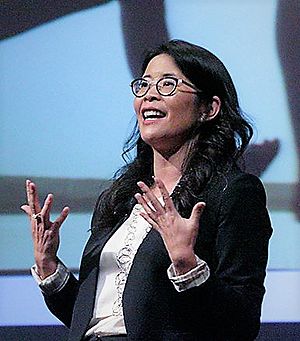Wendy Suzuki facts for kids
Quick facts for kids
Wendy Suzuki
|
|
|---|---|

Suzuki speaks at the National Institutes of Health in 2016
|
|
| Alma mater | University of California, Berkeley (BA) University of California, San Diego (PhD) |
| Awards | Troland Research Award |
| Scientific career | |
| Fields | Neuroscience Psychology |
| Institutions | National Institutes of Health New York University |
| Academic advisors | Marian Diamond David Amaral |
Wendy Suzuki is an American brain scientist, also known as a neuroscientist. She teaches at New York University (NYU) in a special center that studies the brain. She wrote a book called Healthy Brain, Happy Life: A Personal Program to Activate Your Brain and Do Everything Better. Since September 1, 2022, she has been the Dean of the New York University College of Arts & Science. This means she helps lead the college.
Contents
Learning About the Brain
Wendy Suzuki earned her first degree in 1987 from the University of California, Berkeley. She studied how the body works, including human anatomy. There, she met a famous scientist named Marian Diamond. Dr. Diamond taught her that the brain can change and grow based on what we do and learn. This idea is called neuroplasticity.
With a strong interest in how we remember things and how the brain can change, Wendy Suzuki went on to get her Ph.D. in neuroscience. She earned this advanced degree in 1993 from the University of California, San Diego. Her work helped us understand which parts of the brain are important for keeping our long-term memories. For her amazing work, she won an award called the Donald B. Lindsley Prize.
Her Work and Discoveries
After getting her Ph.D., Dr. Suzuki did more research at the National Institutes of Health from 1993 to 1998. She studied how our brains remember where objects are in space.
In 1998, Dr. Suzuki joined the team at New York University. Her main research focuses on neuroplasticity. This is the brain's amazing ability to change and adapt throughout a person's life. Early in her career, she studied the brain areas that help us form and keep memories. More recently, she has also looked at how aerobic exercise (like running or swimming) can make our brains work better.
In March 2022, Dr. Suzuki was chosen to be the Seryl Kushner Dean of NYU’s College of Arts & Science.
How Memory Works in Your Brain
Dr. Suzuki's research began by exploring how memory works. Her lab focused on the hippocampus. This part of the brain is like a special filing cabinet for facts and events. It helps us remember things we can easily talk about, like what you had for breakfast.
Her research group was the first to see big changes in the hippocampus when people formed new memories. They found out how the brain connects different objects together in memory. They also showed how the hippocampus helps us remember the order of events, like what happened first, second, and third.
Exercise and Your Brain
Since 2018, Dr. Suzuki's research has focused on how exercise affects the brain. Her team is trying to figure out the best amount of exercise to help your brain. They want to know how exercise can improve learning, memory, attention, and even your mood.
Her group has found that even a single session of aerobic exercise can make the prefrontal cortex work better. This part of your brain helps with your personality and making decisions. Dr. Suzuki is also looking into how exercise can help people with mood or thinking problems. Her team found that combining exercise with positive thinking can help people who have had a traumatic brain injury.
Sharing Science with Everyone
Dr. Suzuki is also great at explaining science to the public. She wrote the popular book Healthy Brain, Happy Life. In this book, she shares her own story about how exercise changed her life. She also explains the science behind why exercise is so good for your brain. She has appeared on TV shows and podcasts to talk about her research.
She also wrote another book called Good Anxiety: Harnessing the Power of the Most Misunderstood Emotion. In this book, she explains that anxiety can sometimes be helpful. She teaches readers how to use anxious feelings in a smart way. The book also talks about how our brains can change, even when we feel anxious. She notes that these tips are mostly for everyday stress, not for serious anxiety conditions.
Awards and Special Recognitions
Dr. Wendy Suzuki has received many awards for her important work:
- New York University Golden Dozen Teaching Award, 2010
- National Academy of Sciences Troland Research Award, 2004
- McKnight Foundation Scholar Award, 1998 – 2000
- Donald B. Lindsley Prize, Society for Neuroscience, 1994
She also helps lead the McKnight Foundation. She is in charge of the awards for research on memory and thinking problems.

